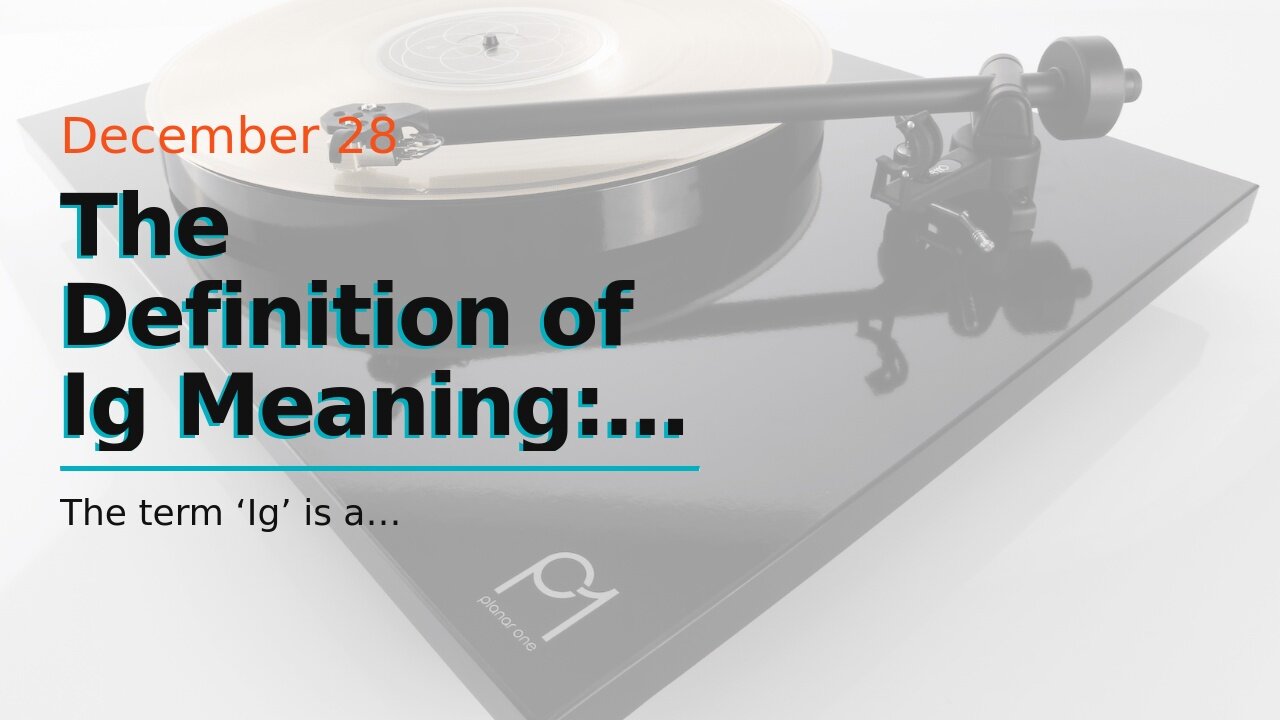Premium Only Content

The Definition of Ig Meaning: Howeverything is Relative
The Definition of Ig Meaning: Howeverything is Relative
The term ‘Ig’ is a relatively new addition to the English language, but it’s one that has quickly become quite popular. So, what does Ig mean? And how is it used?
Ig stands for ‘ignorant.’ It’s often used to describe someone who is unaware of something important or significant. For example, you might say “That guy is so Ig” if he doesn’t know about an upcoming test at school. The term can also be used more broadly to describe anything that is considered unimportant or relatively unimportant. For example, you might say “That party was so Ig” if it was...
https://finetimer.site/the-definition-of-ig-meaning-howeverything-is-relative/
The term ‘Ig’ is a relatively new addition to the English language, but it’s one that has quickly become quite popular. So, what does Ig mean? And how is it used?
Ig stands for ‘ignorant.’ It’s often used to describe someone who is unaware of something important or significant. For example, you might say “That guy is so Ig” if he doesn’t know about an upcoming test at school. The term can also be used more broadly to describe anything that is considered unimportant or relatively unimportant. For example, you might say “That party was so Ig” if it was boring or not very well organized. So, why is everything relative? Simply put, relative means something that is related to or dependent on something else. Everything in the world is relative in some way – everything is connected to something else. And when we say everything, we really do mean everything! Here are some examples of things that are relative: – Your mood is relative to how much sleep you got the night before. – The size of your house is relative to how much money you have. – The taste of food is relative to how hungry you are. As you can see, understanding the concept of relativity can help us make sense of the world around us. And that’s why it’s such an important topic! Photo by Askar Abayev on Pexels The Definition of Ig.
What Ig Means.
Ig is a slang term that stands for “ignorant.” It is often used to describe someone who is acting foolish or making stupid decisions.
How Ig is Used.
The term “ig” can be used as an adjective or a noun. When used as an adjective, it means that the person is ignorant or foolish. When used as a noun, it means the person is an idiot.
The History of Ig.
The origins of the term “ig” are unknown, but it has been in use since at least the early 2000s.
How everything is Relative.
What is Relative.
In everyday usage, the word relative is used to describe something that is connected or associated with something else. For example, you might say that two people are relatives if they are related to each other by blood.
In physics, the word relative has a different meaning. It describes the relationship between two objects or observers. The concept of relativity is important in many areas of physics, including electromagnetism, mechanics and thermodynamics.
How is everything Relative.
The theory of relativity is based on the idea that the laws of physics are the same for all observers, regardless of their relative motion. This means that the laws of physics cannot be used to determine absolute motion; they can only be used to describe relative motion.
The most famous example of this is the Twin Paradox, in which one twin stays on Earth while the other travels away at high speed and then returns. The traveling twin will age less than the stay-at-home twin, due to time dilation effects predicted by special relativity.
Examples of Relative things.
Other examples of relative quantities include distance and velocity. Distance is a measure of how far apart two objects are, while velocity is a measure of how fast an object is moving relative to another object.
In general, any quantity that can be measured has a corresponding unit that defines its magnitude (or size). For example, the SI unit for distance is the meter and the SI unit for velocity is the meter per second (m/s). Defining Relative Clauses
A defining relative clause provides information that is essential to identify the person or thing we are talking about. We often omit the relative pronoun when it is the object of the verb:
The man who/that lives next door is a doctor. (=The man living next door is a doctor.)
The book which/that I bought yesterday was very expensive. (=The book I bought yesterday was very expensive.)
However, we cannot omit the relative pronoun when it is the subject of the v...
-
 3:58
3:58
FineTimer
1 year agoTheHotBit Exchange – Get Your Trading Tips from the Pros!
1.06K -
 1:14:45
1:14:45
Awaken With JP
3 hours agoTrump's Making Everyone His B*tch LOL - LIES Ep 76
24.7K8 -
 1:41:43
1:41:43
Megyn Kelly
22 hours agoMedia's ICE Hoax, Vance's Masterclass on CBS, & Trump vs Bass, w/ Steve Bannon & Batya Ungar-Sargon
30.1K50 -
 DVR
DVR
In The Litter Box w/ Jewels & Catturd
21 hours agoGreen New Scam | In the Litter Box w/ Jewels & Catturd – Ep. 729 – 1/28/2025
25.5K26 -
 2:03:41
2:03:41
The Quartering
4 hours agoTrump To END Income Tax, Captain America Backlash, Obese Rapper Sues Lyft & Surge Pricing In Walmart
50.5K20 -
 1:05
1:05
tether
10 hours agoHadron by Tether - tokenize anything, anywhere
7.55K2 -
 34:32
34:32
Standpoint with Gabe Groisman
19 hours agoGovt. Workers AREN’T Working Says DOGE Chair Sen. Joni Ernst
6.38K5 -
 56:49
56:49
Savanah Hernandez
3 hours agoMASS DEPORTATIONS ARE HERE AND THEY ARE GLORIOUS
13.7K4 -
 21:12
21:12
Clownfish TV
15 hours agoThe Video Game Industry LITERALLY Wants You Dead?!
10.1K4 -
 1:35:44
1:35:44
Right Side Broadcasting Network
5 hours agoLIVE REPLAY: First Press Briefing by White House Press Secretary Karoline Leavitt - 1/28/25
106K98